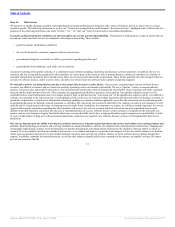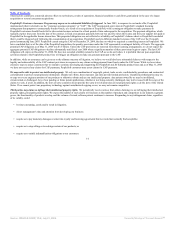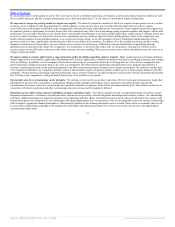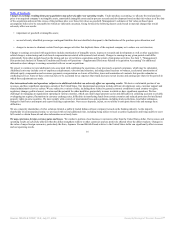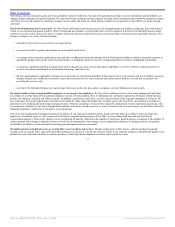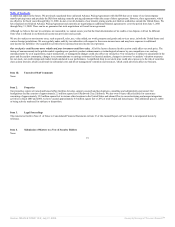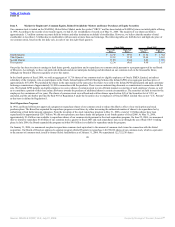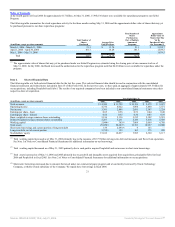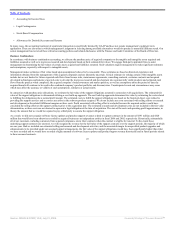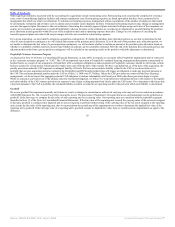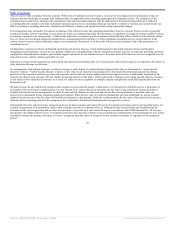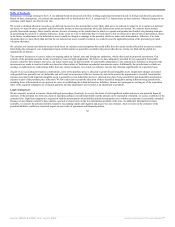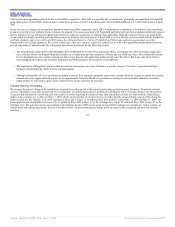Oracle 2005 Annual Report Download - page 25
Download and view the complete annual report
Please find page 25 of the 2005 Oracle annual report below. You can navigate through the pages in the report by either clicking on the pages listed below, or by using the keyword search tool below to find specific information within the annual report.
Table of Contents
Item 7. Management’s Discussion and Analysis of Financial Condition and Results of Operations
We begin Management’s Discussion and Analysis of Financial Condition and Results of Operations with an overview of our key operating business segments
and significant trends. This overview is followed by a discussion of our critical accounting policies and estimates that we believe are important to understanding
the assumptions and judgments incorporated in our reported financial results. We then provide a more detailed analysis of our financial condition and results of
operations.
Business Overview
We are the world’s largest enterprise software company. We are organized into two businesses, software and services, which are further divided into five
operating segments. Each of these operating segments has unique characteristics and faces different opportunities and challenges. Although we report our actual
results in United States dollars, we conduct a significant number of transactions in currencies other than United States dollars. Therefore, we present constant
currency information to provide a framework for assessing how our underlying business performed excluding the effect of foreign currency rate fluctuations. An
overview of our five operating segments follows.
Software Business
Our software business is comprised of two operating segments: (1) new software license revenues and (2) software license updates and product support revenues.
We expect that our software business revenues will continue to increase, which should allow us to improve margins and profits and continue to make investments
in research and development.
New Software Licenses: We license our database, middleware and applications software to businesses of many sizes, government agencies, educational
institutions and resellers. The growth in new software license revenues is affected by the strength of general economic and business conditions, governmental
budgetary constraints, the competitive position of our software products and acquisitions. The new software license business is also characterized by long sales
cycles. The timing of a few large software license transactions can substantially affect our quarterly new software license revenues. Since our new software
license revenues in a particular quarter can be difficult to predict as a result of the timing of a few large software license transactions, we believe that analysis of
new software revenues on a trailing 4-quarter period provides more visibility into the underlying fundamental performance of our software revenues than analysis
of quarterly revenues. New software license margins have been affected by amortization of intangible assets associated with acquisitions.
Competition in the software business is intense. Our goal is to maintain a first or second position in each of our software product categories and certain industry
segments as well as to grow our software revenues faster than our competitors. We believe that the features and functionality of our software products are as
strong as they have ever been. We have focused on lowering the total cost of ownership of our software products by improving integration, decreasing
installation times, lowering administration costs and improving the ease of use. Reducing the total cost of ownership of our products provides our customers with
a higher return on their investment, which we believe will create more demand and provide us with a competitive advantage. We have also continued to focus on
improving the overall quality of our software products and service levels. We believe this will lead to higher customer satisfaction and loyalty and help us
achieve our goal of becoming our customers’ leading technology advisor.
Software License Updates and Product Support: Customers that purchase software license updates and product support are granted rights to unspecified
product upgrades and maintenance releases issued during the support period, as well as technical support assistance. Substantially all of our customers renew
their software license updates and product support contracts annually, thereby eliminating the need to repurchase new software licenses when new upgrades are
released. The growth of software license updates and product support revenues is influenced by four factors: (1) the support contract base of companies acquired
(2) the renewal rate of the support contract base, (3) the amount of new support contracts sold in connection with the sale of new software licenses and
(4) inflationary support price increases.
22
Source: ORACLE CORP, 10-K, July 21, 2006 Powered by Morningstar® Document Research℠


